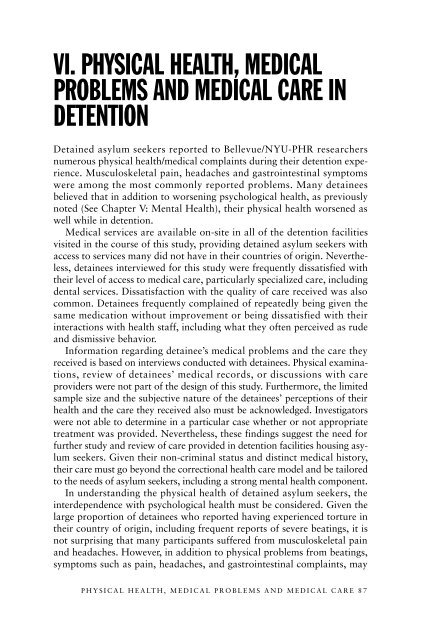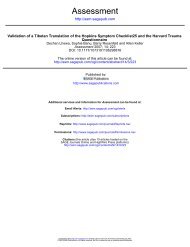From Persecution to Prison - Bellevue/NYU Program for Survivors of ...
From Persecution to Prison - Bellevue/NYU Program for Survivors of ...
From Persecution to Prison - Bellevue/NYU Program for Survivors of ...
You also want an ePaper? Increase the reach of your titles
YUMPU automatically turns print PDFs into web optimized ePapers that Google loves.
VI. PHYSICAL HEALTH, MEDICALPROBLEMS AND MEDICAL CARE INDETENTIONDetained asylum seekers reported <strong>to</strong> <strong>Bellevue</strong>/<strong>NYU</strong>-PHR researchersnumerous physical health/medical complaints during their detention experience.Musculoskeletal pain, headaches and gastrointestinal symp<strong>to</strong>mswere among the most commonly reported problems. Many detaineesbelieved that in addition <strong>to</strong> worsening psychological health, as previouslynoted (See Chapter V: Mental Health), their physical health worsened aswell while in detention.Medical services are available on-site in all <strong>of</strong> the detention facilitiesvisited in the course <strong>of</strong> this study, providing detained asylum seekers withaccess <strong>to</strong> services many did not have in their countries <strong>of</strong> origin. Nevertheless,detainees interviewed <strong>for</strong> this study were frequently dissatisfied withtheir level <strong>of</strong> access <strong>to</strong> medical care, particularly specialized care, includingdental services. Dissatisfaction with the quality <strong>of</strong> care received was alsocommon. Detainees frequently complained <strong>of</strong> repeatedly being given thesame medication without improvement or being dissatisfied with theirinteractions with health staff, including what they <strong>of</strong>ten perceived as rudeand dismissive behavior.In<strong>for</strong>mation regarding detainee’s medical problems and the care theyreceived is based on interviews conducted with detainees. Physical examinations,review <strong>of</strong> detainees’ medical records, or discussions with careproviders were not part <strong>of</strong> the design <strong>of</strong> this study. Furthermore, the limitedsample size and the subjective nature <strong>of</strong> the detainees’ perceptions <strong>of</strong> theirhealth and the care they received also must be acknowledged. Investiga<strong>to</strong>rswere not able <strong>to</strong> determine in a particular case whether or not appropriatetreatment was provided. Nevertheless, these findings suggest the need <strong>for</strong>further study and review <strong>of</strong> care provided in detention facilities housing asylumseekers. Given their non-criminal status and distinct medical his<strong>to</strong>ry,their care must go beyond the correctional health care model and be tailored<strong>to</strong> the needs <strong>of</strong> asylum seekers, including a strong mental health component.In understanding the physical health <strong>of</strong> detained asylum seekers, theinterdependence with psychological health must be considered. Given thelarge proportion <strong>of</strong> detainees who reported having experienced <strong>to</strong>rture intheir country <strong>of</strong> origin, including frequent reports <strong>of</strong> severe beatings, it isnot surprising that many participants suffered from musculoskeletal painand headaches. However, in addition <strong>to</strong> physical problems from beatings,symp<strong>to</strong>ms such as pain, headaches, and gastrointestinal complaints, mayPHYSICAL HEALTH, MEDICAL PROBLEMS AND MEDICAL CARE 87



